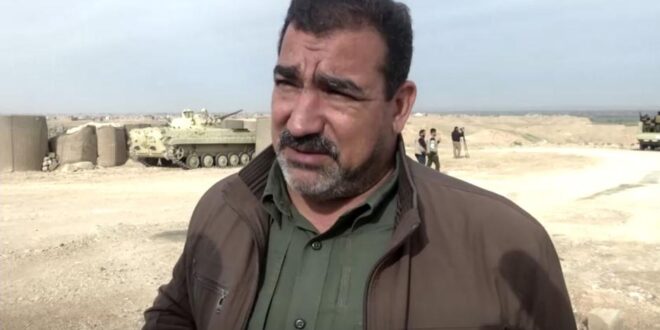Iraqi security forces arrested a senior paramilitary leader on Wednesday in a move that will raise tension with powerful Iran-backed militias accused of attacks on international troops and killing hundreds of protesters and activists.
The arrest puts Prime Minister Mustafa Al Kadhimi’s loyalist security forces in the army and counter-terrorism services directly at odds with the militias that make up an organisation of state-sanctioned groups.
Qassim Musleh, leader of Popular Mobilisation Forces operations in Anbar, was reportedly arrested by troops from the Interior Ministry.
The reasons behind Mr Musleh’s arrest is still unclear but an arrest warrant, widely circulated on social media and confirmed by a court official, said he was wanted over terrorism charges.
Mr Al Kadhimi said a person was arrested in accordance with terrorism laws and based on complaints made against him.
The person is under investigation by a joint committee from the Joint Co-operation Command, Interior Ministry and Military Intelligence Services, National Security and PM Security Department, he said.
Mr Al Kadhimi said armed groups were a “dangerous violation to the Iraqi constitution and valid laws” and ordered an immediate investigation.
Official sources told The National that Mr Musleh was arrested in connection with the murders of activists. It was confirmed by the Associated Press who quoted four security officials confirming that charges were related to the killings of activists in the southern city of Kabala at the order of the Anti-Corruption Committee headed by Lt. Gen. Ahmed Abu Ragheef.
Reuters reported Mr Musleh’s arrest was in connection with a recent rocket attack against the Iraqi-US base at Al Asad. His troops are stationed not far from the base.
“A mutual military and security committee has been formed to lead the investigation in the case,” a government source told the Iraqi state news agency.
The influential Iran-backed Kataib Hezbollah in Iraq accused Mr Al Kadhimi of deliberately going for PMF senior leaders and demanded the immediate release of Mr Musleh.
“We will not be silent about the hostile approach of some figures who work for the benefit of the enemies,” it said.
The UK backed Mr Al Kadhimi’s investigation.
“Iraqis have called for a state where those who break the law are held to account,” it said on Twitter.
“No one should use force and threats to impede criminal investigations.”
In a show of force, the PMF posted fighters around its headquarters inside Baghdad’s Green Zone on Wednesday night.
Mr Al Kadhimi’s office and foreign embassies are also inside the zone.
The Counter-terrorism Service, Federal Police and army also posted personnel inside and outside the Green Zone.
Security force convoys of more than two vehicles have been banned from entering Baghdad or moving in its streets, says a government order seen by The National.
Any arrest case should run its course, as goes for any Iraqi. And surely, nobody should resort to a show of force to get their way. Such behaviour weakens the Iraqi state and further erodes public trust. State institutions must be respected at all times. Nobody is above the law.
— Jeanine Hennis (@JeanineHennis) May 26, 2021 Alarmed by the developments, the UN special representative in Iraq, Jeanine Hennis-Plaeschert, said on Twitter that “any arrest case should run its course, as goes for any Iraqi”.
“And surely, nobody should resort to a show of force to get their way,” Ms Hennis-Plaeschert said.
“Such behaviour weakens the Iraqi state and further erodes public trust. State institutions must be respected at all times. Nobody is above the law.”
Since taking office in May, Mr Al Kadhimi has tried to rein in militias backed by Tehran but has so far failed.
Mr Musleh also runs a militia group called Al Tufuf, which worked alongside Iran-backed groups in Al Qaim, a strategically important town on the border with Syria.
On Tuesday, security troops killed two protesters in Baghdad who were demanding justice for scores of assassinated activists.
The demonstrators carried pictures of the dead and shouted, “Who killed me?”
Mr Al Kadhimi repeatedly promised investigations into protesters’ deaths.
In June 2020, the country’s counter-terrorism force arrested 14 militiamen from Kataib Hezbollah, which has a prominent role in the PMF.
The men were accused of planning a rocket attack on Baghdad’s Green Zone but they were released days later and the case was dropped.
In December, security troops arrested Hamid Al Jazairi, the former deputy commander of Al Khorasani Brigades, another prominent Iran-backed group, and more than a dozen of his followers.
The following day, the group’s commander, Ali Al Yassiri, was arrested. Officials said they were arrested over corruption charges.
When Iraqi security forces crumbled in mid-2014 as ISIS swept through northern and western Iraq, volunteers and militias answered a call from the country’s influential Shiite cleric, Grand Ayatollah Ali Al Sistani, to join the fight.
Some of the groups were newly formed and loyal to Mr Al Sistani, and refrained from attacking international forces or killing protesters.
But they have since moved closer to Iraq’s Defence Ministry leaving other, more powerful groups such as Kataib Hezbollah and Al Tufuf to continue operations on Iran’s behalf.
As major military operations ended and ISIS was declared defeated in late 2017, many Shiite militias competed for lucrative government rebuilding deals in the liberated areas, many of which were in ruins.
Some of the Iran-allied faction within the PMF are accused of assassinating activists and protesters since 2019, when pro-reform, anti-Tehran rallies broke out.
 Eurasia Press & News
Eurasia Press & News




